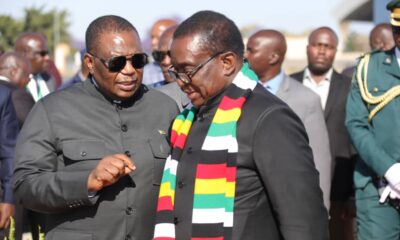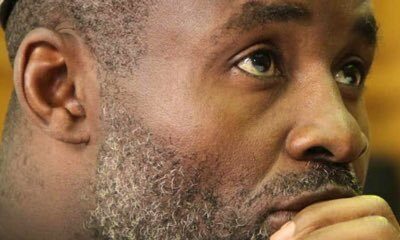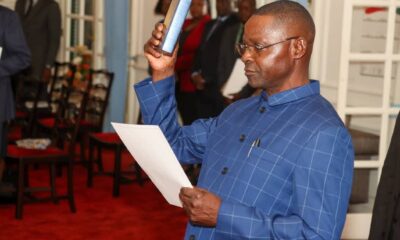BRENNA MATENDERE
ZAMBIA has urged the Southern African Development Community (Sadc) and the African Union (AU) to intervene and resolve its diplomatic tiff with Zimbabwe after President Emmerson Mnangagwa’s recent remarks in a meeting with Russian President Vladimir Putin in which he insinuated that Lusaka has become a regional security threat on account of its association with the United States.
Mnangagwa said Zambia is destabilising the region by collaborating with the United States on security matters, further straining relations between Zimbabwe and Zambia.
“They support our neighbours Zambia and Malawi very heavily. Americans are consolidating their power in that country, Zambia, both in terms of security and in terms of financial support to Zambia, to make sure we feel lonely,” stated Mnangagwa.
Newly-appointed Zambian Foreign minister Mulambo Haimbe reacted robustly in that country’s Parliament in Lusaka to Mnangagwa’s statement during his recent visit to Russia for the St Petersburg International Economic Forum, saying the remarks constitute an “unwarranted attack on Zambia’s sovereignty”.
Haimbe, a former Justice minister, said Sadc and the AU must intervene.
“The statements made by President Mnangagwa are not only baseless but also damaging to the spirit of unity and mutual respect that underpins our regional cooperation. We call upon (Southern African Development Community) Sadc and the (African Union) AU to address this matter decisively and conclusively to preserve the integrity of our regional partnerships.”
Mnangagwa, through his remarks to Putin, sparked controversy. The neighbouring countries have enjoyed cordial relations since time immemorial. Zimbabwe and Zambia were one country from 1953 to 1963 under the Federation of Rhodesia and Nyasaland.
Zambia supported Zimbabwe’s liberation struggle on top of that.
In addition, Zambia has also been lobbying and calling for the lifting of targeted Western sanctions on Mnangagwa, his wife Auxillia and others under the US embargo.
Besides, Mnangagwa grew up in Zambia and is equally Zambian to all intents and purposes.
This also came in the context of a parliamentary debate on the controversial establishment of a United States Africa Command (Africom) office in Lusaka.
Zambian MPs showed concern over the matter, saying the divisive Africom manoeuvre might explain the discomfort of some Sadc countries.
Some MPs and other Zambians are opposed to Africom having an office in Zambia, saying it might create problems in the region.
Africom says its mission, with its partners, is to counter “transnational threats and malign actors, strengthen security forces, and respond to crises” in order to advance US national interests and promote regional security, stability, and prosperity.
In reply to the MPs’ concerns and criticism, Haimbe said:
“The Africom office is aimed at strengthening our security infrastructure and fostering greater cooperation in combating transnational threats. It should not be viewed as a security risk but rather as a testament to our commitment to regional peace and stability.”
While the Africom issue has always created heated debate in Africa, Mnangagwa’s gripe is not necessarily Africom — which on its own is an important issue — but that President Hakainde Hichilema used his influence as chair of the Sadc troika of the organ on politics, defence and security, through the regional bloc’s election observer mission to Harare, to reject Zimbabwe’s fraudulent and disputed 2023 general elections.
That also included rejection of Mnangagwa’s own re-election, compounding his legitimacy question.
Sadc adopted its election observer report rejecting Mnangagwa’s re-election through special meetings in Zambia and Angola, saying Zimbabwe’s poll outcome failed to meet its own internal constitutional and legal benchmarks, as well as the Sadc principles and guidelines governing democratic elections.
That left Mnangagwa seething with anger and he is fighting Zambia behind the scenes over that.
Mnangagwa internationalised the fight by reporting Zambia to Putin, trying to manipulate the US and Russia geopolitical turf war in southern Africa for his own political ends, not even Zimbabwe’s national interest.
The US embassy in Harare dismissed the claims Mnangagwa made to Putin.
The US charge d’affaires in Harare, Elaine French, said in a statement that contrary to Mnangagwa’s claims, her country was providing the biggest bilateral assistance to Zimbabwe compared to other countries.
She said her country had given more than US$5 billion aid to Harare since Independence in 1980.
“The United States has been and will continue to be a reliable partner with the people of Zimbabwe. Our more than $5 billion in health, humanitarian, and development assistance since Zimbabwe’s independence has rehabilitated health clinics, provided lifesaving medications, and now has helped families make ends meet during this devastating drought.
“The United States is not running away. It is making good on its commitment to support the health and prosperity of Zimbabwe’s 16 million people,” French said in a statement.
According to the diplomat, Washington provided US$11 million in food security aid to Zimbabwe in January this year as more than six million people faced hunger due to drought induced by the El Niño phenomenon.
In an interview with NewsHub in Bulawayo, Effort Ncube, an international relations and political analyst, described President Mnangagwa’s statements in Russia as an unnecessary diplomatic blunder.
According to Ncube, Mnangagwa’s “gaffe” had compromised his impartiality as the incoming Sadc chair.
Zimbabwe will take over the annual chairmanship from Zambia in August.
“That is going to undermine the already difficult relations between Zimbabwe and Zambia,” Ncube said.
Relations between Harare and Lusaka became particularly frosty after Zimbabwe’s 2023 general elections which were condemned by the Sadc election observer mission.
The mission was chaired by former Zambian vice-president Nevers Mumba who was recommended to the post by that country’s President andoutgoing Sadc chair Hakainde Hichilema.
Zambia has publicly announced that it is engaging Harare over Mnangagwa’s remarks to Putin.
Zambia has publicly opposed the ongoing invasion of Ukraine by Russia, in line with US policy, at a time countries like Zimbabwe have backed Putin.





















